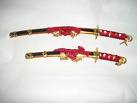
Samurai Swords Farewell to Manzanar, Chapter 6 - Whatever he did Had Flourish
1. Jeanne likens her father's cane to a kind of swagger stick, a baton carried by military officers as a symbol of authority. What else does she compare it to and what is the historical significance of the comparison?
2. To understand Ko Wakatsuki's character, it is necessary to understand his background in Japan. The Japanese class system was very strong. List the four traditional social classes from highest to lowest:
a)
b)
c)
d)
3. How was Japanese society changing in the late 1800s? What historical event brought about this change?
4. How did this metamorphosis change affect the social rank of the Wakatsuki family in Japan? How did Ko view the change and what did he do as a result?
5. After getting off the boat in Hawaii, why was he dismayed disappointed when he looked for work and why was he met with derision ridicule by other workers?
6. About Ko, his daughter writes, "Mama's parents were terrified when they saw him coming." Explain why.
7. Why did Ko always drift from job to job? What does this suggest about his character? According to the narrator, what hindrances obstacles blocked him?
8. With hindsight, Jeanne gives a balanced view of her father. At the end of p. 58, which words paint a negative portrait of her father? What traits are more positive?
9. Explain the title: "Everything He Did Had Flourish." Use details from pages 57 and 59 to support your answer.
10. What had happened in camp that made it necessary for Ko to use a cain?